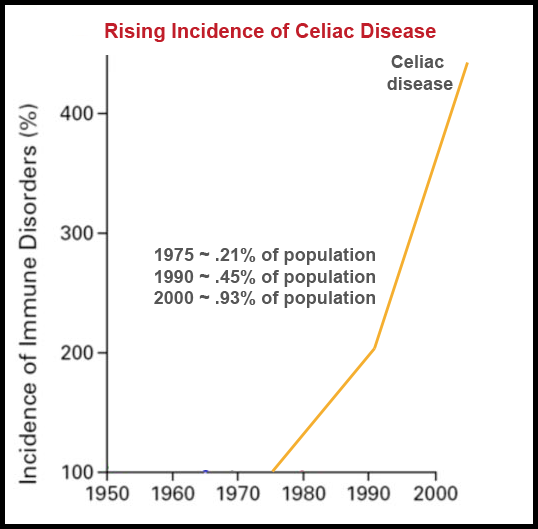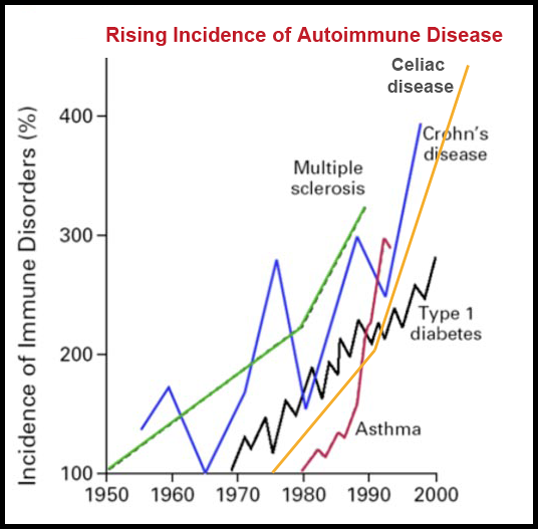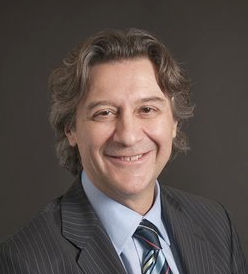If you have the gut feeling that celiac disease is on the rise, you’re absolutely right. As we’ve documented in this blog before, the actual incidence of celiac disease has grown about 400% since the early 1950s, as the first graph below shows. Celiac disease, as most everyone knows by now, is a serious auto-immune disease in which the gluten proteins in wheat, barley, and rye cause the body to turn upon itself and destroy the lining of the digestive tract.
The documented increase in celiac disease has led to all kinds of finger pointing: Today’s wheat is different It’s GMO No, it’s the pesticides Since cave men didn’t eat grains, we shouldn’t either. One important factor gets left out of many of these claims, however: the fact that auto-immune disease overall has risen at a rate similar to that of celiac disease.
That’s right: asthma, Type 1 diabetes, multiple sclerosis, Crohns disease, and other autoimmune disease have also tripled or quadrupled in incidence, right alongside celiac disease, as you can see in the second graph. Can all of these also be caused by the arch-villain gluten Not likely. So whats at work here
Dr. Alessio Fasano, Director of the Center for Celiac Research at Mass General Hospital for Children and recognized as one of the worlds foremost experts on celiac disease, ran through the options when he spoke at our Whole Grains Breaking Barriers conference in November 2014.
Over decades of research, he has looked into every possible factor that can lead to the development of celiac disease, and one by one eliminated most of them with rigorous research. His conclusion Changes in our microbiome, the trillions of bacteria in our gut, are the main driver of increases in celiac disease.
We are the combination of two ecosystems: us, and these bacteria that live with us, Fasano explains. While many of us may be born with certain genes that can predispose us to celiac disease or any disease whether we actually get that disease may depend in large part on our gut microbes. In describing the way genes and the microbiome interact, Fasano asks us to picture a piano and a piano player.
The human genome can be compared to a piano with roughly 25,000 to 30,000 notes, one for each gene. Its stable. You bought the piano. You can’t change it anymore. If you strike certain notes, you may play the song celiac disease.So be it. But these notes are not necessarily played all the time. Whether or not they’re played depends on the piano player, which is the microbiome.
We’re all born with a certain microbiome, which Fasano explains may be like Elton John is playing the piano. Then you take antibiotics, take a trip to Cancun and get drunk over there anything that potentially can change the microbiome and suddenly Chopin is sitting at the piano. He is much more virtuoso, he plays all the notes, and suddenly you have celiac disease, at any age.
What can we do, then, to keep our microbiome functioning well, and to make it less likely well get celiac disease, or asthma, multiple sclerosis, or any of a number of auto-immune diseases Heres Alessio Fasanos conclusion:
Nutrition, among all the influential elements that can change the microbiota composition, is the key element. True we are using a lot of antibiotics, true that there are a lot of infections, true that C-section delivery is much more popular than in the past, true we travel a lot and therefore we live in a different world, but nutrition, among all the elements, is the most influential to shape our microbiome. After all this is an ecosystem, a parallel civilization that lives in our gut. And they need to eat. And they are fed the leftovers of what we put in our mouths. Its becoming extremely clear: it’s the microbiome that will really shape the function of our immune system.
Gluten, in short, isnt the problem. Its the canary in the coal mine that is alerting many of us to a dysfunctional and diminished gut microbiome that could end up affecting many aspects of our health. Instead of cutting out gluten, lets get to the bottom of whats happening within our guts.
Dr. Fasano will be one of the experts speaking at Oldways Finding Common Ground conference in November in Boston. We look forward to hearing him once again clarify the facts about gluten and about the gut microbiome at this event.
Are you intrigued by the role of the microbiome in health We urge you to read the fascinating book Missing Microbes: How the Overuse of Antibiotics is Fueling our Modern Plagues, by Martin Blaser, MD, director of the Human Microbiome project at NYU and an excellent writer. Blaser explains how certain gut bacteria may protect us from specific diseases and how we may, in the future, replace those bacteria to treat disease.










Leave a comment